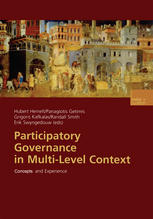

Most ebook files are in PDF format, so you can easily read them using various software such as Foxit Reader or directly on the Google Chrome browser.
Some ebook files are released by publishers in other formats such as .awz, .mobi, .epub, .fb2, etc. You may need to install specific software to read these formats on mobile/PC, such as Calibre.
Please read the tutorial at this link. https://ebooknice.com/page/post?id=faq
We offer FREE conversion to the popular formats you request; however, this may take some time. Therefore, right after payment, please email us, and we will try to provide the service as quickly as possible.
For some exceptional file formats or broken links (if any), please refrain from opening any disputes. Instead, email us first, and we will try to assist within a maximum of 6 hours.
EbookNice Team

Status:
Available5.0
9 reviews
ISBN 10: 3663110052
ISBN 13: 9783663110057
Author: Hubert Heinelt, Hubert Heinelt, Panagiotis Getimis, Grigoris Kafkalas, Randall Smith, Erik Swyngedouw
The book addresses theoretically and empirically the question under what conditions innovative and sustainable policies can be achieved through participatory governance.
1 Achieving Sustainable and Innovative Policies through Participatory Governance in a Multi-level Context
1.1 Introduction
1.2 The Empirical Arenas
1.3 Theoretical Reflections
1.4 References
The Theoretical Debate
2 Governance and Meta-governance in the Face of Complexity: On the Roles of Requisite Variety, Reflexive Observation, and Romantic Irony in Participatory Governance
2.1 Introduction
2.2 Fuzzy Terms and Failed Practices
2.3 Introducing Some Conceptual Clarity
2.4 Governance as the Art of Complexity
2.5 Governance Failure and the Meta-governance Response
2.6 Responses to Meta-governance Failure
2.7 Conclusions
2.8 References
3 The Normative Desirability of Participatory Governance
3.1 Introduction
3.2 The Commission’s White-Paper Proposal to Democratise European Governance
3.3 The Idea of Democratic Legitimacy
3.4 The Idea of Transnational Constitutionalism
3.5 The Idea of Trust: A Normative Free-standing View on Democratic Legitimacy
3.6 References
4 Participatory Governance and Urban Citizenship
4.1 Two Concepts
4.2 Why Care about Citizenship in Empirical Research?
4.3 Reformulating some of the Empirical and Theoretical Findings in Terms of Citizenship
4.4 References
5 Technological Governance — Technological Citizeship?
5.1 Technological Innovation, Democratic Governance and the Return of the Citizen
5.2 Technological Citizenship
5.3 Conclusion
5.4 References
The Empirical Arena
6 Sustainability and Policy Innovation in a Multi-Level Context: Crosscutting Issues in the Water Sector
6.1 Introduction
6.2 Governing Water
6.3 Policy and Participation in the Water Sector: National and European Crosscutting Issues
6.4 Conclusions: Innovation, Sustainability and the Myths of Participatory Governance
6.5 References
7 EMAS: An Instrument for Realising Sustainable Innovations? Messages from Empirical Research
7.1 Introduction
7.2 Implementing EMAS at National Level
7.3 EMAS and New Forms of Governance? Comparing the Implementation in Germany, Greece and the UK
7.4 References
Conclusion
8 Empirical Evidence and Comparative Analysis of Policy-Making in the Pursuit of Innovation and Sustainability
8.1 The Comparative Framework
8.2 Governance Paradigms: Supranational Players and the Role of Nation States
8.3 The Local Context: The Shifting Roles of Holders and Territorial Specificity
8.4 Water Supply Systems and EMAS: Systemic and Contingent Aspects in the Pursuit of Innovation and Sustainability
8.5 Conclusions: Opportunities and Risks of Participatory Governance, the Improbability of Success and a Plea for Re-regulation and Flexibility
8.6 References
participatory governance theory
participatory democracy data
governance participatory
participatory democracy evidence
questions about participatory governance
participatory vs shared governance
universal participation in democracy
Tags: Hubert Heinelt, Hubert Heinelt, Panagiotis Getimis, Grigoris Kafkalas, Randall Smith, Erik Swyngedouw, Participatory, Governance